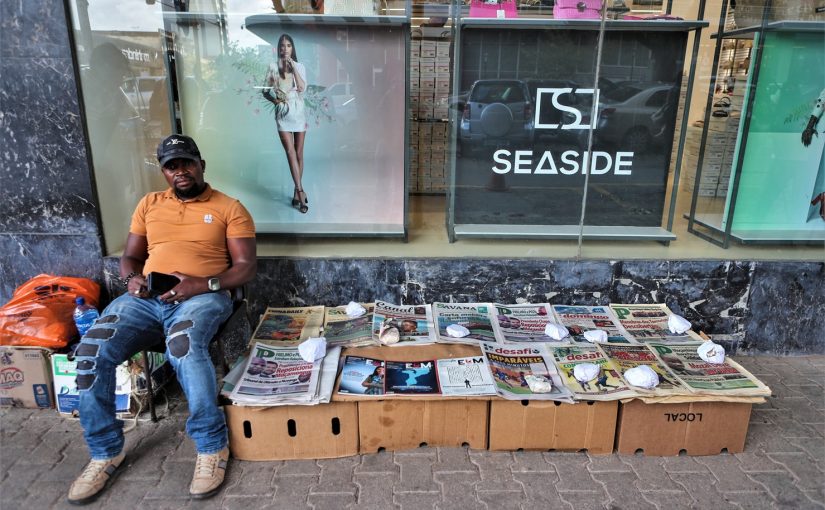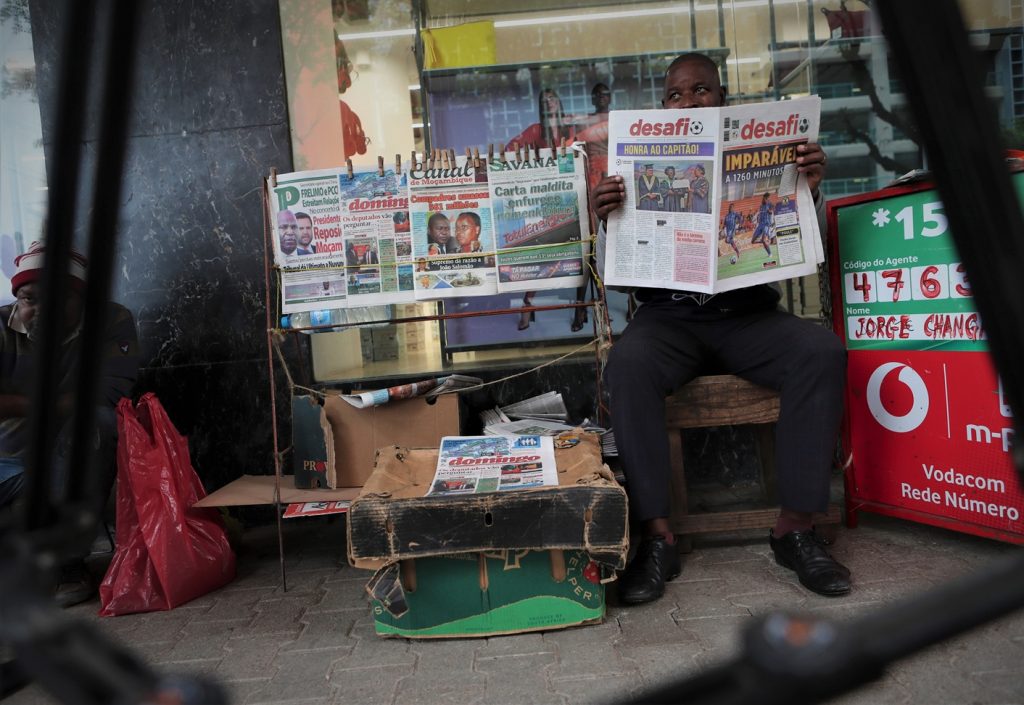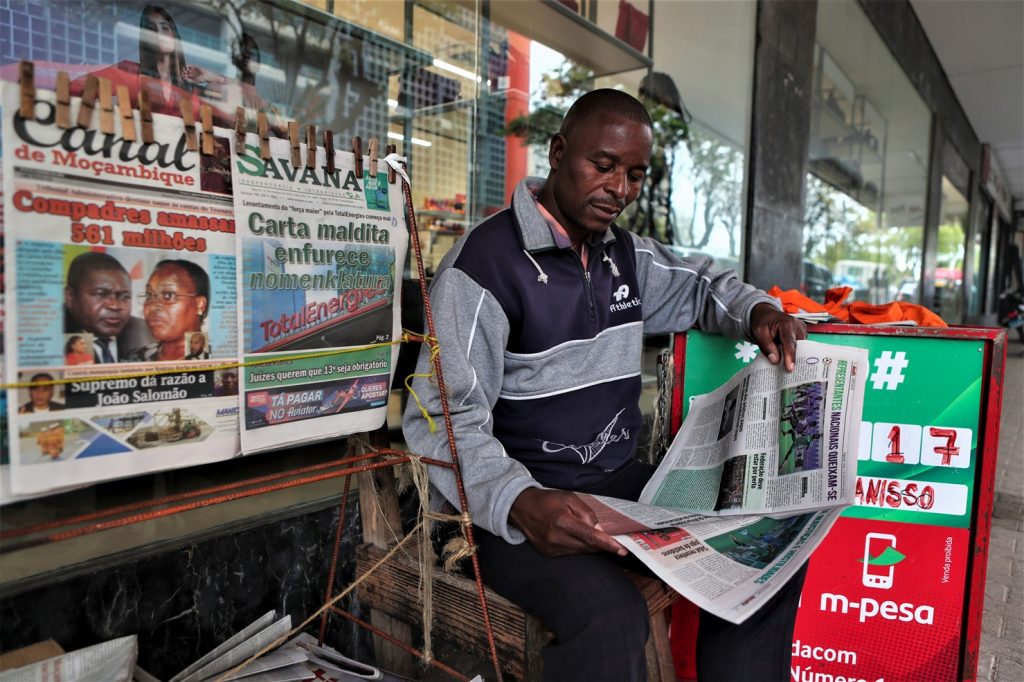Mozambique: Chapo invites American businesses to invest
Mozambique: Newspaper vendors struggle in Maputo as internet takes toll

Photos: Luisa Nhantumbo/Lusa
Jorge Francisco is one of the many Maputo newspaper vendors who has seen sales “plummet” after the Covid-19 pandemic, with the internet “killing the business”, going days without selling a copy.
“The [newspaper] Canal [de Moçambique] comes out on Wednesday, by Thursday they’ll take one or two papers, Friday one or two. Saturdays are worse. I’ve been coming here for a fortnight in a row without selling any newspapers, including Notícias [the daily], which is the people’s newspaper,” Jorge Francisco, 47, told Lusa.
He has been selling newspapers in the centre of Maputo for 33 years, at the intersection of 25 de Setembro and Samora Machel avenues, where he starts delivering newspapers to subscribers at 06:00 local time, before setting up his stall.
“Now, I don’t even advise anyone to sell, to get into this business, because we had the time of Covid-19 and then there were some people who came out in the press saying that newspapers are part of the transmission of Covid-19. We continue to fight, but other newspapers have fallen,” says Jorge, who regrets the drop in sales.
The pandemic has seen the disappearance of many daily and weekly publications, which, he says, have been unable to stand the test of time and have put the brakes on circulation.
“It’s gone down a lot,” he adds, referring to daily sales. “I used to sell 150 Canal, I used to sell 100 Canal without any problem. I remember that I could leave the house without any money, but I’d end up buying 100 newspapers with the profits, make money and buy another 100 newspapers and run out,” he recalls.
Today, from the 100 newspapers a day that he used to order to sell, he’s down to 25, which never run out, and for those in the business, there’s still the loss, affecting the bills for the bread that was meant for the family.
To get by in this daily struggle, there are only a few subscribers, but they continue to buy the printed material.
“Now what’s affecting the newspapers is the electronic system. I arrive at 6 a.m. or 7 a.m. and bring newspapers, but you’re home at 5 a.m. and the newspaper is on your mobile phone. Technology has ruined our business,” says Jorge, who is resorting to other businesses, such as mobile wallet sales, to stay afloat.
Next to Jorge is Francisco Mutemba, 48, who has been selling newspapers since 1992 and has had to reinvent himself in the market to survive, moving into the mobile wallet business and assembling office equipment, recognising that the newspaper business is “no longer going”.
“At the beginning, business was good, but now with the internet, there’s no business. The internet is killing the newspaper business because people pick up everything there; a news item comes out straight away. The newspaper is a repetition of what came out,” he told Lusa.
Before the internet and Covid-19, he sold at least 100 copies of the daily Notícias and 70 of the weekly Magazine Independente each day, but now only subscribers are trying to bring Francisco’s business back to life, and he believes the “cost of living” is also affecting sales.
“It’s one of the factors, people no longer have the culture of buying newspapers because when someone gets money, it’s to buy bread and there’s no money left over to buy newspapers,” he explained to Lusa.
At the junction of Eduardo Mondlane and Mártires da Machava avenues, 29-year-old Celso Zandamela has been selling newspapers for 13 years. He says the business is failing because young people lack reading habits and therefore don’t buy newspapers.
“For example, in the places where I leave the newspaper, people don’t bother to read it, they only remember when there’s a competition. Nowadays, people no longer read newspapers, but it’s not because of technology, people no longer have a culture of reading, either newspapers or books,” he told Lusa.
“What’s weakening the business, I can tell you, is that now people are justifying it because of the financial difficulty. The newspaper itself is a bit expensive now, but it’s not because it’s expensive that people can’t buy it,” adds Celso.

He agrees that Covid-19 affected business, but rejects the idea that technology is the main cause, pointing instead to the lack of a taste for reading, which, he says, is a long-standing problem among young people.
He used to sell at least 120 copies of the daily newspaper Notícias every day, but now he only takes 40 and has trouble selling them.
“It’s a figure that [means] we’re selling newspapers out of love for the business, because we’ve been there for a long time and there’s no income,” Zandamela points out.

Still in the centre of Maputo, Lusa spoke to Bento Benedito, 34, who has been selling newspapers for 10 years along Avenida 24 de Julho, and who says that today the newspaper “has no outlet” due to the internet, which allows instant access to information, surpassing printed newspapers in terms of timeliness.
“Things are difficult, we work with customers, there are people who still like to read the physical newspaper, but there are few people who do, especially young people, nowadays they buy technology. It’s rare to find a young person buying the paper,” he says.
Before the pandemic, he sold 100 copies a day, but now he sells fewer than 10, saying the business has become “unsustainable”.
Asked if the internet is putting the brakes on print sales, the paperboy has no doubts: “a lot, a lot, it’s killing, it’s really killed, we can only adapt and do other things”.
To survive, we can only turn our attention to other businesses, because nowadays “those who buy newspapers because it’s in their blood are few”.













Leave a Reply
Be the First to Comment!
You must be logged in to post a comment.
You must be logged in to post a comment.